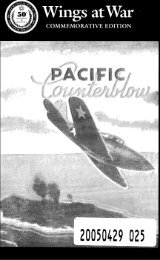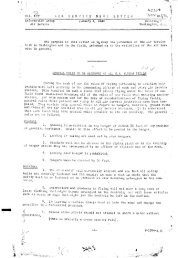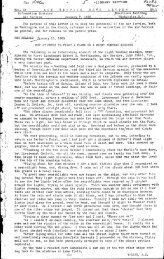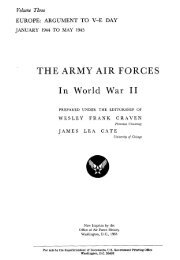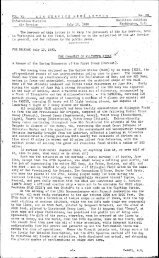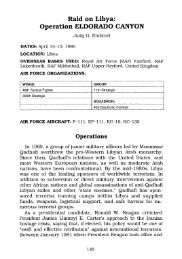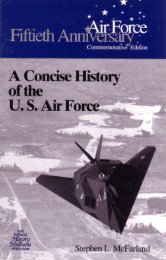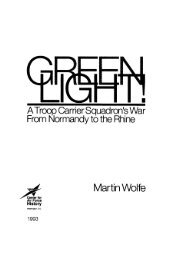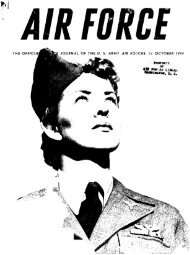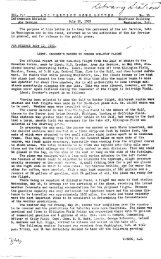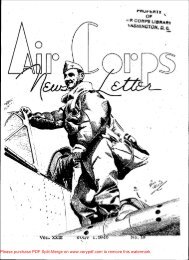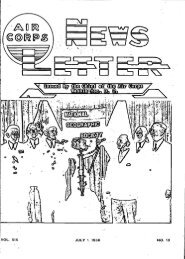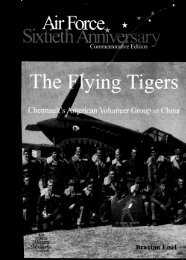- Page 2 and 3:
Piercing the Fog Intelligence and A
- Page 4 and 5:
FOREWORD WHEN JAPAN ATTACKED PEARL,
- Page 6 and 7:
PREFACE THE MILITARY CALAMITY IN EU
- Page 8 and 9:
AUTHORS ALEXANDER S. COCHRAN, Jr.,
- Page 10 and 11:
TABLE OF CONTENTS Page FOREWORD ...
- Page 12 and 13:
Contents Chapter 7 Planning the Def
- Page 14:
Contents P-38andP-51EscortRanges ..
- Page 17 and 18:
Piercing the Fog entered the war, a
- Page 19 and 20:
Piercing the Fog prevented from dev
- Page 21 and 22:
Piercing the Fog that no modern air
- Page 23 and 24:
Piercing the Fog areas, the G-2 had
- Page 25 and 26:
Piercing the Fog addressed at war
- Page 27 and 28:
Piercing the Fog Events in the war
- Page 29 and 30:
Piercing the Fog The G-2-A-7 people
- Page 31 and 32:
Piercing the Fog many means to obta
- Page 33 and 34:
Piercing the Fog photography and ma
- Page 35 and 36:
Piercing the Fog aeronautical devel
- Page 37 and 38:
Piercing the Fog naval superiority
- Page 39 and 40:
Piercing the Fog GHQ Air Force comm
- Page 41 and 42:
Piercing the Fog bases would be ava
- Page 43 and 44:
Piercing the Fog target determinati
- Page 45 and 46:
Piercing the Fog Japanese Army avia
- Page 47 and 48:
Piercing the Fog On the other side
- Page 49 and 50:
Piercing the Fog completely changed
- Page 51 and 52:
Piercing the Fog aircraft, successf
- Page 53 and 54:
Piercing the Fog During 1934-1935,
- Page 55 and 56:
Piercing the Fog operations, the st
- Page 57 and 58:
Piercing the Fog headed an Air Esti
- Page 59 and 60:
Piercing the Fog intelligence compr
- Page 61 and 62:
Piercing the Fog as it left the AAF
- Page 63 and 64:
Piercing the Fog folders. It was wi
- Page 65 and 66:
Piercing the Fog Maj. Gen. Henry H.
- Page 67 and 68:
Piercing the Fog already promised t
- Page 69 and 70:
Piercing the Fog to the Philippines
- Page 72 and 73:
CHAPTER 2 The Tools of Air Intellig
- Page 74 and 75:
Tools of Air Intelligence Italy, bu
- Page 76 and 77:
Tools of Air Intelligence message a
- Page 78 and 79:
Tools of Air Intelligence cryptogra
- Page 80 and 81:
Tools of Air Intelligence Despite t
- Page 82 and 83:
Tools of Air Intelligence and use o
- Page 84 and 85:
Tools of Air Intelligence that incl
- Page 86 and 87:
Tools of Air Intelligence Lt. Gen.
- Page 88 and 89:
Tools of Air Intelligence believed
- Page 90 and 91:
Tools of Air Intelligence have take
- Page 92 and 93:
Tools of Air Intelligence cripple t
- Page 94 and 95:
Tools of Air Intelligence At the ta
- Page 96 and 97:
Tools of Air Intelligence variety o
- Page 98 and 99:
Tools of Air Intelligence emplaceme
- Page 100 and 101:
Tools of Air Intelligence Second-ph
- Page 102 and 103:
Tools of Air Intelligence tions dif
- Page 104 and 105:
Tools of Air Intelligence more incl
- Page 106 and 107:
Brig. Gen. Ira C. Eaker Tools of Ai
- Page 108 and 109:
Brig. Gen. George C. McDonald (Cour
- Page 110 and 111:
Tools of Air Intelligence continued
- Page 112 and 113:
Tools of Air Intelligence the most
- Page 114 and 115:
Tools of Air Intelligence were into
- Page 116 and 117:
Tools of Air Intelligence foreign o
- Page 118 and 119:
Tools of Air Intelligence Part of t
- Page 120 and 121:
Tools of Air Intelligence The resul
- Page 122 and 123:
Tools of Air Intelligence Washingto
- Page 124:
Tools of Air Intelligence interroga
- Page 127 and 128:
Piercing the Fog slowly and with se
- Page 129 and 130:
Piercing the Fog information and th
- Page 131 and 132:
Creating the Office of the Assistan
- Page 133 and 134:
Piercing the Fog press of daily act
- Page 135 and 136:
Piercing the Fog technical intellig
- Page 137 and 138:
Piercing the Fog time, the U.S.S. P
- Page 139 and 140:
Piercing the Fog numbered air force
- Page 141 and 142:
Air Intelligence Training One of th
- Page 143 and 144:
Piercing the Fog The average age of
- Page 145 and 146:
Piercing the Fog responsive to chan
- Page 147 and 148:
The Air War in Europe: Organizing E
- Page 149 and 150:
Piercing the Fog The exception to t
- Page 151 and 152:
Piercing the Fog perspective of whe
- Page 153 and 154:
Piercing the Fog Force history cred
- Page 155 and 156:
Piercing the Fog these earlier esti
- Page 157 and 158:
Piercing the Fog Even before the No
- Page 159 and 160:
Piercing the Fog at sea increased.
- Page 161 and 162:
Piercing the Fog to construction ya
- Page 163 and 164:
Piercing the Fog to the Mediterrane
- Page 165 and 166:
Intelligence Implications for the S
- Page 167 and 168:
Piercing the Fog both the data and
- Page 169 and 170:
Piercing the Fog The visitors recei
- Page 171 and 172:
Piercing the Fog economy. . . .”2
- Page 173 and 174:
Piercing the Fog and Y intercepts a
- Page 175 and 176:
Piercing the Fog number of airfield
- Page 177 and 178:
Piercing the Fog nated photoreconna
- Page 179 and 180:
Piercing the Fog identified appropr
- Page 181 and 182:
Piercing the Fog source of British
- Page 183 and 184:
Piercing the Fog sance, they concen
- Page 186 and 187:
B Y CHAPTER 4 The European Theater
- Page 188 and 189:
The European Theater of Operations
- Page 190 and 191:
The European Theater of Operations
- Page 192 and 193:
The European Theater of Operations
- Page 194 and 195:
The European Theater of Operations
- Page 196 and 197:
The European Theater of Operations
- Page 198 and 199:
The European Theater of Operations
- Page 200 and 201:
GERMANY - Railroads 185
- Page 202 and 203:
The European Theater of Operations
- Page 204 and 205:
The European Theater of Operations
- Page 206 and 207:
The European Theater of Operations
- Page 208 and 209:
193
- Page 210 and 211:
The European Theater of Operations
- Page 212 and 213:
The Combined Bomber Offensive began
- Page 214 and 215:
199
- Page 216 and 217:
The European Theater of Operations
- Page 218 and 219:
The European Theater of Operations
- Page 220 and 221:
The European Theater of Operations
- Page 222 and 223:
The European Theater of Operations
- Page 224 and 225:
The European Theater of Operations
- Page 226 and 227:
I 21 1
- Page 228 and 229:
The European Theater of Operations
- Page 230 and 231:
I AI 215
- Page 232 and 233:
217
- Page 234 and 235:
219
- Page 236 and 237:
The European Theater of Operations
- Page 238 and 239:
The European Theater of Operations
- Page 240 and 241:
After the ground breakout from the
- Page 242 and 243:
227
- Page 244 and 245:
The European Theater of Operations
- Page 246 and 247:
The European Theater of Operations
- Page 248 and 249:
The European Theater of Operations
- Page 250 and 251:
The European Theater of Operations
- Page 252 and 253:
The European Theater of Operations
- Page 254 and 255:
The European Theater of Operations
- Page 256 and 257:
The European Theater of Operations
- Page 258 and 259:
The European Theater of Operations
- Page 260 and 261:
The European Theater of Operations
- Page 262 and 263:
CHAPTER 5 The Pacific and Far East,
- Page 264 and 265:
The Pacific and Far East In the Pac
- Page 266 and 267:
The Pacific and Far East On the eve
- Page 268 and 269:
The Pacific and Far East semiweekly
- Page 270 and 271:
255
- Page 272 and 273:
The Pacific and Far East throughout
- Page 274 and 275:
The Pacific and Far East strengths.
- Page 276 and 277:
The Pacific and Far East ments over
- Page 278 and 279:
The Pacific and Far East to include
- Page 280 and 281:
The Pacific and Far East On January
- Page 282 and 283:
The Pacific and Far East Guinea fro
- Page 284 and 285:
The Pacific and Far East altering t
- Page 286 and 287:
The Pacific and Far East 18, the pi
- Page 288 and 289:
Two of the coordinated air attacks
- Page 290 and 291:
The Pacific and Far East plus Navy
- Page 292 and 293:
The Pacifrc and Far East protection
- Page 294 and 295:
The Pacific and Far East from the 1
- Page 296 and 297:
The Pacific and Far East landing. N
- Page 298 and 299:
The Pacific and Far East intercept,
- Page 300 and 301:
The Pacific and Far East a suitable
- Page 302 and 303:
The Pacific and Far East four P-38s
- Page 304 and 305:
The Pacific and Far East Allied lea
- Page 306 and 307:
The Pacific and Far East Throughout
- Page 308 and 309:
The Pacific and Far East watchers,
- Page 310 and 311:
The Pacific and Far East The inform
- Page 312 and 313:
CHAPTER 6 Taking the Offensive: Fro
- Page 314 and 315:
= Enerny-Held Areas May 1944 China-
- Page 316 and 317:
Taking the Offensive defend the air
- Page 318 and 319:
Comparative Air Intelligence Functi
- Page 320 and 321:
Taking the Offensive extensive coor
- Page 322 and 323:
Taking the Offensive destroyed, but
- Page 324 and 325:
Eastem Fleet JIIIDIIIIIBIL I I I I
- Page 326 and 327:
Taking the Offensive information on
- Page 328 and 329:
Taking the Offensive a problem that
- Page 330 and 331:
Taking the Offensive field armies,
- Page 332 and 333:
Taking the Offensive The cooperatio
- Page 334 and 335:
Fourteenth Air Force B-25s bomb the
- Page 336 and 337:
Taking the Offensive Maj. Gen. Clai
- Page 338 and 339:
Taking the Offensive March 1945. Wh
- Page 340 and 341:
Taking the Offensive operational ai
- Page 342 and 343:
Taking the Offensive Maj. Gen. Will
- Page 344 and 345:
B-29 Operations Against Japan Takin
- Page 346 and 347:
Taking the Offensive The number, lo
- Page 348 and 349:
Taking the Offensive The list produ
- Page 350 and 351:
Taking the Offensive recording the
- Page 352 and 353:
337
- Page 354 and 355:
Taking the Offensive Japan. The com
- Page 356 and 357:
Taking the Offensive incendiaries l
- Page 358 and 359:
Taking the Offensive Photo of one o
- Page 360 and 361:
Taking the Offensive The crew of th
- Page 362: Taking the Offensive The mushroom-s
- Page 365 and 366: Piercing the Fog completed in Italy
- Page 367 and 368: Piercing the Fog means of obtaining
- Page 369 and 370: Piercing the Fog the fall of 1943,
- Page 371 and 372: Organization: A-2, US. Army Air For
- Page 373 and 374: Piercing the Fog the first two case
- Page 375 and 376: Piercing the Fog White was quite ag
- Page 377 and 378: Piercing the Fog Maj. Gen. Howard C
- Page 379 and 380: Piercing the Fog similar observatio
- Page 381 and 382: Piercing the Fog a Joint Staff plan
- Page 383 and 384: Piercing the Fog gave the benefit o
- Page 385 and 386: Piercing the Fog tions on the mix o
- Page 387 and 388: Piercing the Fog Another group appo
- Page 389 and 390: Piercing the Fog might endanger suc
- Page 391 and 392: Piercing the Fog A difference of op
- Page 393 and 394: Piercing the Fog and assessment had
- Page 395 and 396: Piercing the Fog headquarters, just
- Page 397 and 398: Piercing the Fog of its topography.
- Page 399 and 400: Piercing the Fog duality of thinkin
- Page 401 and 402: Piercing the Fog On May 31 he met w
- Page 403 and 404: Piercing the Fog would have capitul
- Page 405 and 406: Piercing the Fog the JIC was inform
- Page 407 and 408: Piercing the Fog future, only Canad
- Page 409 and 410: Piercing the Fog capabilities and t
- Page 411: Piercing the Fog of a European conf
- Page 415 and 416: Piercing the Fog lacked drop tanks,
- Page 417 and 418: Piercing the Fog Particularly in th
- Page 419 and 420: Piercing the Fog on doing things th
- Page 421 and 422: Piercing the Fog organizations, rep
- Page 423 and 424: Piercing the Fog Speer’s postwar
- Page 425 and 426: Piercing the Fog With the Normandy
- Page 427 and 428: Piercing the Fog buildup to contest
- Page 429 and 430: Piercing the Fog perhaps even could
- Page 431 and 432: Piercing the Fog interpretation of
- Page 433 and 434: Piercing the Fog his Fourteenth Air
- Page 435 and 436: Piercing the Fog plans and B-29 ope
- Page 437 and 438: Piercing the Fog Sweden’s sale to
- Page 440 and 441: NOTES INTRODUCTION Notes to Pages 1
- Page 442 and 443: 21. Ltr, Maj Gen Mason M. Patrick,
- Page 444 and 445: 82. Futrell, Ideas, Concepts, Doctr
- Page 446 and 447: Notes to Pages 61-70 Second World W
- Page 448 and 449: 122. “Photo Intelligence,” in H
- Page 450 and 451: 192. Ibid., pp. 35-36. 193. Ibid.,
- Page 452 and 453: view of the AAF Headquarters Air In
- Page 454 and 455: Notes to Pages 145-155 151. Ltr,Eak
- Page 456 and 457: supply lines to North Africa. He no
- Page 458 and 459: Economic Targets in 1943,” n.d.,
- Page 460 and 461: Notes to Pages 220-230 Powys-Lybbe,
- Page 462 and 463:
235. Haines Report, p. 104. 236. Ib
- Page 464 and 465:
Notes to Pages 253-259 dated May 18
- Page 466 and 467:
Notes to Pages 274-288 228-229. see
- Page 468 and 469:
864.311. 3. Ltrs, Chennault to Biss
- Page 470 and 471:
Wedemeyer to Chennault, Feb 4, 1945
- Page 472 and 473:
1. Ltr, Arnold to Hany L. Hopkins,
- Page 474 and 475:
and Activities in Europe”; memo,
- Page 476 and 477:
course of the conventional bombing
- Page 478 and 479:
Notes to Pages 407416 33. For examp
- Page 480 and 481:
A-2 AA AAF AAFPOA AAFSWPA AAI ABC A
- Page 482 and 483:
MAPRW MASAF MATAF MEW MID NAAF NACA
- Page 484 and 485:
PRIMARY SOURCE MATERIALS for this v
- Page 486 and 487:
Bibliography contains reports submi
- Page 488 and 489:
Bibliography invaluable. Complement
- Page 490 and 491:
Bibliography intelligence studies a
- Page 492 and 493:
Bibliography . Washington Command P
- Page 494 and 495:
Bibliography Kreis, John F. Air Wag
- Page 496 and 497:
Bibliography . The Eagle and the Su
- Page 498 and 499:
“Air Estimate of the Situation fo
- Page 500 and 501:
Index Army Reorganization Act of 19
- Page 502 and 503:
Index objectives, 1944,208,224 POIN
- Page 504 and 505:
need for technical intelligence, on
- Page 506 and 507:
Harris, Arthur T., 412 Harrisburg A
- Page 508 and 509:
incendiary bombing by, 338-42 refle
- Page 510 and 511:
O’Connor, William J., 88 Office o
- Page 512 and 513:
Index Shipping campaign mission dir
- Page 514 and 515:
398 clues of German offensive, 235-
- Page 516:
42d, 188 68th Composite, 3 18, 320





